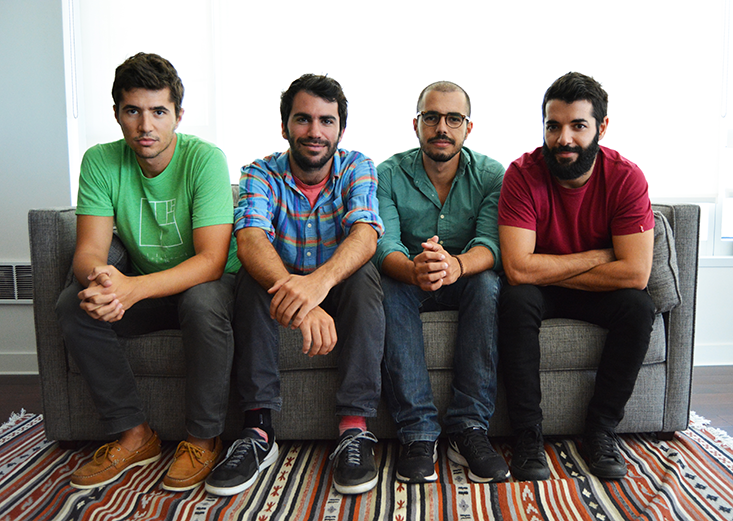
Ever asked what the Internet thought about something and immediately regretted it? The four researchers behind Fermat’s Library, a platform and online community for discussing scientific papers, have had quite a different experience. With 3.5 million monthly visitors across their website, Twitter, and other social presences, Fermat’s Library is more than an academic tool. It is a cross-platform pioneer for public review of published scientific papers—a growing community of scientists and interested non-academics alike that are changing how we think about open access in science.
Fermat’s last theorem, scrawled 380 years ago by the famous mathematician in an arithmetic text, concludes with the note: “I have discovered a truly marvelous demonstration of this proposition that this margin is too narrow to contain.” Now, Y Combinator alums Luís Batalha, Micael Oliveira, and João Batalha, and Stanford University student Tymor Hamamsy are making digital space for these marvelous demonstrations, whomever they may come from.
Nautilus spoke with Fermat’s librarians about opening up academia and how mediums like Twitter are changing science communication.

What was the initial idea behind Fermat’s Library?
Our idea was to create a platform that would facilitate annotation of scientific papers so that it would be easier for people to understand the concepts. We all have a scientific background, so we read quite a few papers throughout the year and understand how dense they can be. We decided to make a journal out of it: We would take a paper, and publish the annotated version on our platform.
Now we have a good community of people who want to contribute, suggest papers, and annotate, so we’ve started taking it to the next level. We made Fermat’s into a tool that can be used by any researcher. People at universities are using our platform with their research groups and students. More recently, we launched “Librarian,” which is a Chrome extension for reading arXiv papers.
Can social media contribute to the process of science?
A story comes to mind from when we annotated a proof for infinitely many prime numbers. This 14-year-old kid read the paper and came out with his own really sharp proof. He wrote a paper and sent it to us. We reviewed it, gave him some feedback, and I think he sent it to a journal. He was just a curious 14-year-old that had been following us, and out of the blue came up with this proof. And it was correct.
It’s peer review via tweets.
This reminded us of another anecdote from last year. The mathematician Terence Tao published something on his blog about a problem that he’d been working on for 10 or 15 years, posed by another mathematician called Paul Erdõs. A guy from Germany went to his blog, commented on one of the papers that he published, and basically allowed him to solve it. The Erdõs discrepancy problem was an 80-year-old puzzle, unlocked by a blog comment.
We can also challenge perceptions of authority in science. When you’re tweeting about math, it’s easier, because it’s easier to prove that you’re wrong. There’s always somebody that comes back to us and goes “Yes, but … you forgot to mention this or that.” That’s great, because it gets the conversation going, and gets more people engaging. If we make a mistake, we definitely hear about it. People can prove us wrong. It’s peer review via tweets.
What are some other memorable papers and posts?
We annotated the shortest paper ever published, written by the mathematicians John Conway and Alexander Soifer. It has 3 words, but of course, it’s not easy to read. Another big one was the first paper that we annotated, about Bitcoin. A lot of people wanted to understand how Bitcoin works. It’s fairly dense, so it takes a while to get your mind around it. We also annotated the paper about the discovery of gravitational waves.
There’s always a trade-off. Too many details can be daunting.
One day, we also featured some “fun facts” about the mathematician Leonhard Euler on Twitter. Euler published most of his research after he went blind at the age of 54. He lost his sight in one eye, kept on doing math, and then lost sight in his other eye. He published half of his research after that point. He’s the most prolific mathematician ever in terms of papers. He also had 10 or so kids, and you read stories of him writing papers completely blind with kids crawling over him. He said that being blind helped him focus more on math.
How is social media shaping access to science?
There are more and more people coming from the science community, being active in social media, and reaching out to the general public. Very serious researchers, like Neil deGrasse Tyson, Sean Carroll, and others are no longer just hiding away in academia; they’re coming forward and speaking out, gathering a social media following. It’s a very good thing. Those people gain influence, and communicate with an audience that, a few years ago, they didn’t have.
Social media also enables partnerships between journals and academic communities. We are partnering with a free online journal called Quantum, which is like arXiv for quantum physics. People can go to those papers, ask questions, and get responses from the authors. This week, arXiv also learned about our Chrome extension and reached out to us about partnering in the future.
There’s a lot of potential in people discovering and commenting, creating discussion around academic papers. In much the same way that GitHub made a huge impact for open source in software, these platforms unleash a lot of potential energy and have a positive impact. We want to do the same for science in general.
What are the challenges of communicating complicated concepts in a public forum?
One of the challenges is gauging how many concepts you need to explain. For example, we’ll be annotating something about prime numbers, and we’ll think, should we explain what a prime number is? The more explanations you have, the bigger the audience that will be able to understand, but at the same time, there’s always a trade-off. Too many details can be daunting.
You also have to have a deep knowledge about what you’re annotating in order to make it concise enough, consumable by an audience that’s generally science-interested, but isn’t necessarily a researcher in a specific area. It can be hard to master a topic and be able to put it down in these terms.
This is really a labor of love, with no intention of profit. We see all of these problems in science access and distribution, and it’s very rewarding to build something that millions of people can appreciate and understand.
Silvia Golumbeanu is an editorial intern at Nautilus.






























